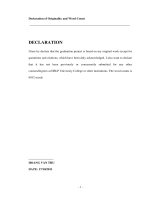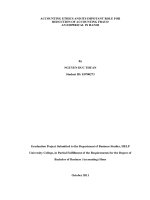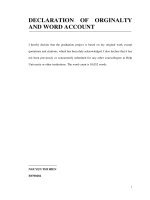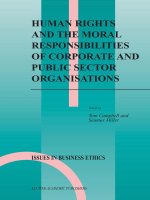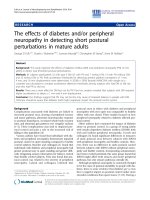fraud and responsibilities of auditor in detecting and preventing of fraud
Bạn đang xem bản rút gọn của tài liệu. Xem và tải ngay bản đầy đủ của tài liệu tại đây (332.33 KB, 56 trang )
i
DECLARATION OF ORGINALTY
AND WORD ACCOUNT
I hereby declare that the graduation project is based on my original work except
quotations and citations, which has been duly acknowledged. I also declare that it has
not been previously or concurrently submitted for any other course/degree at Help
University or other institutions. The word count is 10,052 words.
NGUYEN THI HIEN
E0700282
ii
ACKNOWLEDGEMENT
First of all, I would like to express my sincere appreciation to my supervisor,
Dr. Nguyen Hong Quan who has guided me throughout this study. His constant
guidance, insightful suggestions, and constructive ideas are the essential inputs and
encouragement for me in order to complete this study.
The next, I would like to acknowledge to all manager, auditors and bankers who
allowed and assisted me to collect all of necessary information for me to get this
study done. Without their contribution, I could not be able to gather much
information for my research.
Lastly, I would also like to extend my heartfelt gratitude to my friends for their
continuous support, encouragement and contribution, which have been crucial during
the presentation of this report.
My study cannot be finished without your supports.
THANKS FOR EVERYONE
iii
FRAUD AND RESPONSIBILITIES OF AUDITOR
IN DETECTING AND PREVENTING OF FRAUD
BY
NGUYEN THI HIEN
OCTOBER 2011
Supervisor: NGUYEN HONG QUAN
ABSTRACT
The purpose of this paper is to discuss about the fraud and the responsibilities of
auditor in detecting and preventing of fraud. Fraud can be considered as most
concerning problem of the business. Because of this have more effect to all most of
companies in the world. However, the companies can make more motivations from
fraudulent activities, then, this trend is being likely continued in the futures. There
are many types of fraud such as accounting fraud, investment frauds, financial fraud,
etc.
Fraud is one of the big issues to make more damage in the company. Therefore, the
responsibilities of auditor play important in detecting and preventing fraud. In this
study, I will discuss about this, and some issues that related to audit procedure that
auditor applied in working process.
iv
TABLE OF CONTENT
DECLARATION OF ORGINALTY AND WORD ACCOUNT i
ACKNOWLEDGEMENT ii
ABSTRACT iii
TABLE OF CONTENT iv
LIST OF TABLE vii
LIST OF ABBREVIATIONS viii
CHAPTER 1: INTRODUCTION 1
1.1 Background of study 1
1.2 Objective of research 2
1.3 Problem of Statement 3
1.4 Limitation of research 5
1.5 Structure of research 5
CHAPTER 2: LITERATURE REVIEW 7
2.1 Fraud 7
2.1.1 Definition of fraud 7
2.1.2 Differences between fraud and error 10
2.2 Motivations of Fraud behavior 12
2.3 Responsibilities in fraud detection and prevention 13
2.3.1 Responsibilities of internal auditor 13
2.3.2 Responsibilities of external auditor 14
2.5 Audit procedure 17
v
CHAPTER 3: RESEARCH METHODOLOGY 19
3.1 Research problem 19
3.1.1 Aim of the research 19
3.1.2 Objective of the research 19
3.2 Data collection 20
3.2.1 Primary data 20
3.2.2 Secondary data 21
3.3 Research Instrument 22
3.3.1 Survey 22
3.3.2 Questionnaire 23
3.3.2.1 Questionnaire about the extent of fraud 25
3.3.2.2 Questionnaire about the responsibilities of auditor 25
3.3.2.3 Questionnaire about the audit procedure that auditor applied in
detecting and preventing of fraud 26
3.4 Sampling 26
3.5 Limitation of research 26
CHAPTER 4: FINDING AND ANALYSIS 27
4.1 Analysis of responses related to extent of fraud 28
4.1.1 Existence and extent of fraud 28
4.1.2 Differences between fraud and error 30
4.2 Analysis of responses related to the role and responsibility of auditors for
fraud detection and prevention. 31
4.3 Analysis of responses related to audit procedure 34
CHAPTER 5: CONCLUSION 38
5.1 Awareness of respondents about the extent of fraud 38
vi
5.2 Awareness about the responsibilities of auditor 39
5.3 Awareness of respondents related to audit procedures 40
5.4 Recommendation 41
5.5 Scope of future research 42
REFERENCES 44
ANPENDIX A: QUESTIONNAIRES 46
vii
LIST OF TABLE
TABLE 1: Responses by groups of respondents
TABLE 2: Perceptions of extent of fraud
TABLE 3: Responses related to the different between fraud and error
TABLE 4: Responsibility of auditors for fraud detection and prevention
TABLE 5: Audit procedure applied for fraud detection
viii
LIST OF ABBREVIATIONS
ISA: International Standard of Auditing
SAS: Statement on Auditing Standard
1
CHAPTER 1
INTRODUCTION
1.1 Background of study
In recent year, fraud crime has more increased in over the world, and professionals
believe that fraud is this trend will be continuing in the future. Evidence is, there are
many cases about fraud that have occurred throughout over the world such as Enron
and WorldCom. When scandals happen, companies have tried to keep these scandals
quite, sometimes outsiders did not know. Many business frauds are happening in
everyday, but it does not noticed. Unfortunately, scandals are the tip of the iceberg
and represent visible failures. These companies could really go down for such
setbacks. In addition, with the development of technology, especially, it is expanding
of computers into businesses. These can make organizations more vulnerable to the
fraud.
In late year 2001, Enron and WorldCom events declared bankrupt with debts of huge
scandals involved in the operation of Authur Andersen auditing firm. This event has
forced experts paid more attention to audit risk and continually improve the quality
of audit activities. Therefore, the auditor plays important role in the work of
detecting fraud. The need for auditors may be seen as a response to the agency
problem and the audit functions as a mechanism to attest to the accountability and
stewardship of company management to reduce the possibility of innocent mistakes
and deliberate misstatements such as fraud and management manipulation (Chandler,
Edwards and Anderson, 1993). The role of auditor plays importance in detecting and
2
preventing fraud, although it is difficult to uncover the conclusive fraud. In order to
combat the fraud in businesses, management of business as well as the auditors, must
have to do the right job and their obligations.
Therefore, in this study, the researcher will discuss more detailed information
relating to fraud and the role of auditor in preventing and detecting its.
1.2 Objective of research
This study is to help the reader to understand some issues that related to fraud and
the responsibilities of auditor in preventing and detecting fraud. Accordingly, this
study will provide some objectives below.
The first objective, the researcher wants to provide all necessary information relating
to the fraud. In order to help readers understand about the topic, fraud will be
dividing in to three parts. The first past will support for the overview of fraud. The
second past will provide some detailed information relating to difference between the
fraud and error. The third part will answer the question why some companies are
motivated by fraudulent.
The next objective is to clarify the importance of auditor and the responsibilities of
auditor in preventing and detecting fraud. Following this, the objective of this study
is to obtain from the view of some respondents about mistake actions in fraud. We
can warn businesses about fraud and the potential threats of it. In addition, the
readers can understand about the audit procedure that auditor applies in searching
and preventing of fraud.
3
1.3 Problem of Statement
As mentioned above, this study concentrates on discussion about the concept of
fraud. First, this study provides the definition and conceptualization of it in general.
Some concepts of fraud are discussed to help readers get overview of fraud.
There are many definitions about the fraud. Fraud can define from the legal point of
view. For example, in criminal law, fraud is defined as cheat, misguidance, and
delusion for profit purposes by inducing damage (Mr. Alexandru Boroi, Dictionary
of Criminal Law). In Civil law, Mr. Mircea N. Costin also defines fraud as an
intentional violation by the parties of the mandatory provisions of the legislation in
force, often by using perfidious means, at the conclusion or execution of a legal act
(Dictionary of Civil Law). Put simply, fraud is way to trick you out of your money.
Following Aderibigbe and Dada (2007), fraud is a deliberate deceit planned and
executed with the intent to deprive another person of his property or rights directly or
indirectly, regardless of whether the perpetrator benefits from his/her actions.
Fraud is difference with error. However, some people are confused with two
definitions. In this study, we will discuss about the differences between the fraud and
error. In addition, the study also will give reasons why companies are motivated by
fraud above. Various studies said about the issue of motivation of fraud. For
example, in the Enron case, the accountants of this company have wrong doings in
writing false statement about the losses and profit of Enron. According to James
Bodurtha, Jr., he shows that from 1997 until its demise, “the primary motivations for
Enron's accounting and financial transactions seem to have been to keep reported net
4
income and reported cash flow up, gross asset value inflated, and liability off the
books”. After accounting scandal, Enron has lost the trust of company,
Fraud can have more effect for many companies. Therefore, in this study, we will
discuss about the responsibilities of auditor. As we know that, the auditors play
important role in detecting and preventing for fraud. Under the SAS No.53, the
auditor's responsibility is to detect and report errors and irregularities. This standard
issued by the Accounting Standards Board (1988). Auditors have greater
responsibility for detection of accounting fraud than was currently being met. In
addition, "The auditor has a responsibility to plan and perform the audit to obtain
reasonable assurance about whether the financial statements are free of material
misstatement, whether caused by error or fraud. Because of the nature of audit
evidence and the characteristics of fraud, the auditor is able to obtain reasonable, but
not absolute, assurance that material misstatements are detected. The auditor has no
responsibility to plan and perform the audit to obtain reasonable assurance that
misstatements, whether caused by error or fraud, that are not material to the financial
statements are detected."(SAS No. 1, Codification of Auditing Standards and
Procedures). This standard shows that auditors can base the action of plan and
perform an audit to obtain reasonable assurance about whether financial statements
are free of material misstatement; the auditors can prevent the fraud and reduce the
risk for company.
In this study, we will discuss more about the responsibilities of auditor in preventing
and detecting for fraud by answering these issues above.
5
1.4 Limitation of research
Fraud is one of broad definition. Many topics related to fraud such as accounting
fraud, financial fraud, and so on. Thus, this is limitation of study because it is hard
for researcher to cover all topics here.
Moreover, time is one of the limitations of this study. The researcher has not enough
time to conduct all information of all aspects that related this topic. Therefore, in this
study, the researcher is only focus on some aspects and all necessary information to
help reader understanding effectively.
1.5 Structure of research
This study is divided into five following chapters. These chapters are introduction,
literature review, research methodology, case study analysis, and conclusion and
recommendation. This study is arranged as above as to give the reader to understand
this paper on the logical way.
The title of chapter 1 is "Introduction". This chapter will provide the general picture
of the topic that the researcher want to discuss in this study
The title of chapter 2 is “Literature review”. This chapter will bring all necessary
information that related to the fraud such as various concepts of fraud as well as
some differences between fraud and error. The next, we analysis different
motivations for fraud use. The project continues with the responsibilities of auditors
in preventing and detecting of its.
6
The title of chapter 3 is “Research methodology”. This chapter will analyze some
data collection methods that will use in this study such as primary data, secondary
data, questionnaires or survey, so on.
The title of chapter 4 is “Finding and Analysis”. This chapter will analyze all the
collected information from useful data sources such as secondary data and survey
questions with using some audit standard.
The title of chapter 5 is “Conclusion” that will summarize and evaluate all the results
that researcher discussed above and after then various recommendations for the issue
of this study.
7
CHAPTER 2
LITERATURE REVIEW
Chapter Literature Review was developed to provide framework relating to fraud and
the responsibility of auditor in preventing and detecting fraud. The objective of
chapter 2 is to provide some of various studies and theories around this definition of
fraud and responsibilities of auditor. Then, this also helps readers to have overview
of this topic.
2.1 Fraud
In this section, we will discuss some of aspects that related to the fraud. In order to
help the readers understand the fraud by effective way, this section will be divided
into two parts. The purpose of doing that is to provide some of the definitions for the
fraud that many people or website said. In addition, the readers can have
distinguished between fraud and error.
2.1.1 Definition of fraud
Fraud is a trend that has increased over the recent year in the world. There are many
companies that occurred scandal of fraud suffered several damages, and even related
to the law. For example, Bernard Ebbers the former chairman of WorldCom was
jailed for 25 years for orchestrating a $US11 billion financial statement fraud
(Belson, 2005). Thus, fraud is important issue for all business. In this section, the
literature review shows that fraud is broad definition. There are many ways to define
8
the fraud and abuse by many studies prior. Now, the researcher would like to show
these definitions below.
Fraud, According to Brink and Witt (1982), is an ever present threat to the effective
utilization of resources and it will always be an important concern of management.
Based on many impacts of fraud in the recent time, we recognize that fraud is
potential threats. This is a threat for using of resources, so management must
consider careful to avoid the fraud in the company. In addition, Following the
Webster's New Universal Unabridged Dictionary, fraud is "intentional deception to
cause a person to give up property or some lawful right". While according to
Accounting and auditing definition, fraud is an intentional act that results in the
material misstatement in financial statement that is the subject of an audit. The fourth
definition comes from the Association of Fraud Examiners. They further define
occupational fraud and abuse as a form of abuse occupational to make personal
interests through deliberate misuse and misapplication of assets or resources of the
company (Report to the Nation on Occupational Fraud and Abuse, 1999). Beside
these definitions above, Federal Bureau of Investigation also describes fraud as the
deceptive practices of money or property of others in ways such as stealing of assets,
larcenies by bailee and bad checks, except forgeries and counterfeiting (FBI
1984:342). After understand some definitions of fraud above, we realize that the
common thing between these definitions of fraud is an intentional deception to the
satisfaction of an individual or group.
In addition, Adeduro, 1998 and, Bostley and Drover 1972 also define Fraud. Fraud
can be seen as act of intentional misrepresentation or concealing activities in contrast
9
to the truth, making influence and causing of financial losses for an individual or an
organization. This includes theft, embezzlement or any attempt to steal, illegally
obtain, and misuse or damage the property of the company. This definition also has
similar content with the definition of Weirich and Reinstein, they define fraud as
“intentional deception, cheating and stealing” (2000 cited in Allyne & Howard
2005).
Moreover, ISA 240 „The Auditor‟s Responsibilities to Consider Fraud in an Audit of
Financial Statement (Revised)‟ defines fraud by another way. This standard said that
governance of entity, management, employees or the third parties have intentional
actions by using deceptions to obtain personal interest or illegal advantages. These
deception acts or dishonest behaviors such as omissions and making of false
statement by orally or in writing to obtain benefits or have more advantages from
eluding of liability(Anti-fraud policy in Murdoch University (2001). While
Aderibigbe and Dada (2007) also refers to fraud as the intentional acts that are
planned and implemented with the purpose of depriving another person's property by
the both directly or indirectly ways, regardless of benefit or not from these action.
In the world, there are some studies about classical fraud. The first study is to
mention is the work of Donald R. Cressey (1919-1987). Donald R. Cressey is a
crime researcher at Indiana University (USA) at 40 years of the 20th century. Cressy
has chosen to research the issue of corruption, embezzlement, as the subject for his
doctoral thesis. He gives the model: Triangle fraud to present the factors leading to
the fraud that has now become one of the orthodox models used in many different
careers in research fraud, including the audit profession. Fraud triangle consists of
10
three factors that are opportunities attitude and personality, and pressure. The next
studies, D. W. Steve Albrecht, he is a criminologist working at Brigham Young
University (USA). He along with two colleagues Keith Howe and Marshall Rommey
has analyzed 212 cases of fraud in the 1980s under the sponsorship of the
Association of Research founder of internal audit. He has published works: "Burial
of fraud, the prospect of internal audit." The purpose of this study is to identify
important signs of fraud to the manager can prevent and found them.
Fraud can occur in many sectors, and it can be classified many type such as
accounting fraud, investment frauds, embezzlement, or miscellaneous fraud.
Therefore, all companies should consider carefully. The next, we will discuss some
studies prior about distinguish of fraud and error.
2.1.2 Differences between fraud and error
Nowadays, the fraud and abuse is one of big problem for all businesses. However,
most of them still confuse between fraud and honest mistake or error. Before
understanding the differences between them, the researcher will help the reader to
know about each of two concepts.
Firstly, Fraud, according to Mr. Mircea N. Costin, in his “Dictionary of Civil Law”,
they define fraud as an intentional behaviors by an individual or an organization shall
be mandatory by law, often by using treacherous means, when conclusion and
implementation the act of law. Fraud involves like that:
Amendment documents, accounting records falsified financial statements;
inadequate capital assets;
11
omission of some transactions in records or covering or deliberate omission
of information or documents of economic and falsifying financial statements
recording of transactions without substance;
Intentional misapplication of standards, principles, methods and regulations
on accounting, financial policies
In contrast to fraud, error is unintentional actions and to an involuntary
misstatement that happened in financial statements, including the omission in
writing or disclosure financial statement, error could occur when:
collecting and processing data on financial statement
An incorrect accounting estimate occurred due to overlooking or mistake of
facts;
In applying accounting policies related to data assessment, recognition,
classification or disclosure.
Everyone can make mistakes, including scientists. It is thing that no doubt. You can
easily misspell a word and can move two digits in a number of records, or can easily
press the wrong on your computer. However, do have different between fraud and
honest mistake or error? The different between fraud and error is action that seems to
be matter of intention. Following ISA 240 (redrafted), it said that „The distinguishing
factor between fraud and error is whether the underlying action that results in the
misstatement of the financial statements is intentional or unintentional.‟ ISA 240
(Redrafted), paragraph 2. That mean Fraud is underlying action that has results
12
intentional, while error is done by accidents. A website also provided introduction
for student about this distinction. It is "On Being a Scientist".
"Of all the violations of the ethos of science, fraud is the gravest. As with
error, fraud breaks the vital link between human understanding and the
empirical world, a link that is science's greatest strength. But fraud goes
beyond error to erode the foundation of trust on which science is built."
(Committee on the Conduct of Science, 1989)
By way of contrast to fraud, we can see the different between fraud and error.
However, in this study, the researcher is to focus on fraud than error because fraud
responsibility is more controversial than error.
2.2 Motivations of Fraud behavior
This study will give reasons why companies use fraud in company above. Nowadays,
there are some research studies, which said about some of motivation lead to the
fraud behavior. Some motivations such as the existence of tax levies based on
income, confidence by shareholders and employees in management that is able to
report stable earning and expectations relating to the increase or decrease in
anticipated income (Hepworth, 1953). Niskanen & Keloharju (2000) and Herrmann
& Inoue (1996) are also showed that tax is mentioned as a significant motivator.
Some companies can have fraud because of avoiding the tax. They will change their
income to decrease the tax. Thus, existence of tax is one of the motivations that we
think first when a companies are to fraud.
13
Other motivation of fraud is made income smoothing on expectation. In addition,
some companies is making a bad loss seeks to maximize the report loss in that year
and the future year will be appear better. However, there are some individual that
motivated by fraud because their own interest. This has bad influence toward the
company. The company will lose the trusted and valued employee who generally
commits fraud. When frauds discovered, they will be shock and disbeliefs that they
could have committed such act.
2.3 Responsibilities in fraud detection and prevention
As we discussed above, fraud is one of big issues in all businesses. Some studies said
about fraud and the responsibility of auditor. External and internal auditors achieved
a high level of consensus in their financial statement fraud risk ratings suggesting
that internal auditors are as aware as external auditors of where fraud is likely to
be detected (Apostolou et al. 2001). Therefore, in this section, the researcher will
discuss about the responsibilities of both internal and external auditor in detecting
and preventing fraud.
2.3.1 Responsibilities of internal auditor
Internal auditor plays an important role in fraud detection following by IIA's
Frequently Asked Questions (IIA 2008). Following Proficiency Standard (1210.A2)
of IIA International Standard for the Professional Practice of Internal Auditing, the
internal auditors are person who have enough knowledge and information to evaluate
the risk of fraud in company to manage company, but they are not experience or
expertise ability of a responsible person is to detect and investigate fraud. This
14
standard is also promotes that the internal audit activity must evaluate the potential
for occurrence of fraud and how the organization manages fraud risks.
Beside that, according to ISA 240 (redrafted), this standard said that both
management and governance of entity must have responsibilities for detection and
prevention of fraud, and it is primary responsible of them (ISA 240, para.4).
Corporate governance includes various activities implementation by the board of
directors and audit committee to ensure the wholeness of the financial reporting
process (Public Oversight Board 1993). And Beasley et al. (2000) observe a
reduced incidence of fraud among companies having an audit committee. The
internal auditors' are part of the company. Thus, to prevent fraud, managers and
governance in the company is person whose detect and prevent fraud efficiently.
Therefore, internal auditors (or manager) of company have directly responsible for
preventing, detecting and dealing with fraud and errors in the company through the
development and implementation of regular maintenance accounting system and
internal control systems appropriate. Because of inherent limitations of accounting,
systems and internal control systems can be difficult to complete exclude the
possibility of fraud or error.
2.3.2 Responsibilities of external auditor
As we know that, the main purpose of an external auditor is to detect fraud and error
in the long time. In the pre-1920‟s phase, Porter study shows that the primary
objective of an audit was to detect fraud. In addition, following ISA 240 (redrafted)
shows that the objectives of auditors in finding frauds are following:
15
The external auditor must identify and evaluate the risks of material
misstatement of the financial statements to detect fraud;
The external auditor must evaluate some risks of material misstatements to
detect fraud by collecting enough appropriate evidences, through designing
and implementing appropriate responses; and
To demand appropriately to identified or suspected fraud
According to Porter (1997) also said that the responsibilities of external auditor are to
detect and report fraud over the centuries, and it is historical development of
responsibilities of auditor. Through number of stages, this study is to evaluate the
practices of auditing and shift to the auditing paradigm. In the pre-1920 above,
objective of auditor is to detect fraud. However, in the 1930's, this objective has
changed to objective of accounts. In the 1960's, the external auditors are to refuse the
responsibilities for detection of fraud, it is why media and public are not satisfy with
auditors. In the process to detect the fraud, auditors are generally failed to detect it.
There are many criticisms about the inefficient of action of auditing. In the 1980's,
with the developing of technology, number of incidents of fraud is one of big issue in
the world. There are many fraudulent behaviors such as cutting costs, spending
corporate and shareholder money on personal expenses, and manipulating financial
records for personal needs. For example, in the 1980's, a case of fraud is Lincoln
Savings and Loan scandal. In April 1989, after seized control of Lincoln Savings and
Loan, the Federathe Home Loan Bank Board have only 23 per cent of $ 5.3 billion of
assets that invested in residential mortgage loan, 67 per cent is invested in high risks
land venture and some projects of development commercial. This is contrast in the
16
agreement purchase of Keating. As we all know, fraud spreads everywhere, so the
responsibilities of auditor is to detect the fraud.
Moreover, following the study of Boynton et al (2005), his study shows that after
falling of Enron, the courts have changed in audit standard to emphasize the
important of responsibility of auditor in fraud detection. Specially, this is content of
ISA 240, „The Auditor‟s Responsibilities to Consider Fraud in an Audit of Financial
Statement (Revised)‟ and ISA 315, „Understanding the Entity and Its Environment
and Assessing the Risks of Material Misstatement‟.
According to ISA 240, paragraph 5, this sates that „An auditor conducting an audit in
accordance with ISAs is responsible for obtaining reasonable assurance that the
financial statements as a whole are free from material misstatement, whether caused
by fraud or error.‟ Beside that, under ISA 240, the state of Boynton et al (2005) is
also similar with content of paragraph five of ISA 240. This is during process of
audit, the responsibilities of auditor must require to proactive in uncovering the
fraud. For example, the duty of auditor including errors in accounting estimates
unusual transactions that appear to lack business rationale, etc.
While ISA 315 said about the responsibility of auditor. Following ISA 315, auditors
are to be required to assess the effectiveness of risk management framework in
preventing misstatements in the process of an audit. However, this requirement is not
necessary for the responsibility of auditor. This is idea of Boynton et al (2005).
Other way is to understand about the responsibility of auditor by SAS no.82, issued
by American Institute of Certified Public Accountants. The responsibilities of the
17
auditor are to plan and perform an audit to determine the free of the material
misstatement in financial statement of company by collecting evidence to obtain
reasonable assurance.
To sum up, to accomplish its responsibilities before the object using the results of the
audit, the auditor must comply with the principles and auditing standards, which
must always keep the independence, integrity and objectivity in the audit process.
The auditors are supposed to detect material misstatements to uncover fraud in the
company and even as the offense (if any) of business leaders. During the audit,
auditors and audit firms are responsible for assisting the company to detect, treat and
prevent fraud and errors, but the auditors and audit firms are not responsible for
direct in preventing fraud and errors in the company that they audit.
2.5 Audit procedure
As we know that, any industry sector or activity exists and audit risk is no exception.
Risk in the audit was very special because the audit is a specific field of activity -
taking users of financial statements for those serving as principal. Audit procedures
are one of the procedures to detect fraud in auditing of financial statement. Audit
procedure is very important to help auditors improving the quality and minimize the
risk of testing activities of auditing. However, in the current practical, applying of
audit procedures to detect fraud in financial reporting are remaining incomplete due
to many complex nature of fraud and the limitations inherent in the testing activities
of auditing.

